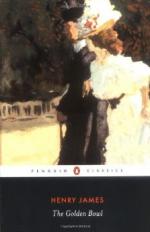of having, from the first of her trouble, really found
her way without his guidance. She asked herself
at times if he suspected how more than subtly, how
perversely, she had dispensed with him, and she balanced
between visions of all he must privately have guessed
and certitudes that he had guessed nothing whatever.
He might nevertheless have been so urbanely filling
up gaps, at present, for the very reason that his
instinct, sharper than the expression of his face,
had sufficiently served him—made him aware
of the thin ice, figuratively speaking, and of prolongations
of tension, round about him, mostly foreign to the
circles in which luxury was akin to virtue. Some
day in some happier season, she would confess to him
that she hadn’t confessed, though taking so much
on her conscience; but just now she was carrying in
her weak, stiffened hand a glass filled to the brim,
as to which she had recorded a vow that no drop should
overflow. She feared the very breath of a better
wisdom, the jostle of the higher light, of heavenly
help itself; and, in addition, however that might
be, she drew breath this afternoon, as never yet,
in an element heavy to oppression. Something
grave had happened, somehow and somewhere, and she
had, God knew, her choice of suppositions: her
heart stood still when she wondered above all if the
cord mightn’t at last have snapped between her
husband and her father. She shut her eyes for
dismay at the possibility of such a passage—there
moved before them the procession of ugly forms it
might have taken. “Find out for yourself!”
she had thrown to Amerigo, for her last word, on the
question of who else “knew,” that night
of the breaking of the Bowl; and she flattered herself
that she hadn’t since then helped him, in her
clear consistency, by an inch. It was what she
had given him, all these weeks, to be busy with, and
she had again and again lain awake for the obsession
of this sense of his uncertainty ruthlessly and endlessly
playing with his dignity. She had handed him
over to an ignorance that couldn’t even try to
become indifferent and that yet wouldn’t project
itself, either, into the cleared air of conviction.
In proportion as he was generous it had bitten into
his spirit, and more than once she had said to herself
that to break the spell she had cast upon him and
that the polished old ivory of her father’s inattackable
surface made so absolute, he would suddenly commit
some mistake or some violence, smash some windowpane
for air, fail even of one of his blest inveteracies
of taste. In that way, fatally, he would have
put himself in the wrong—blighting by a
single false step the perfection of his outward show.




